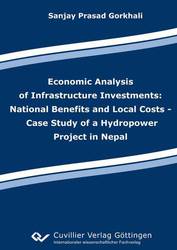| Areas | |
|---|---|
| Serie de libros (96) |
1380
|
| Nachhaltigkeit |
3
|
| Gesundheitswesen |
1
|
| Letra |
2371
|
| Medienwissenschaften | 16 |
| Teología | 57 |
| Filosofía | 102 |
| Derecho | 424 |
| Economía | 851 |
| Ciencias sociales | 419 |
| Ciencias del deporte | 48 |
| Psicología | 233 |
| Educación | 190 |
| Historia | 183 |
| Arte | 111 |
| Ciencias culturales | 166 |
| Literatur | 117 |
| Lingüística | 88 |
| Ciencias Naturales |
5408
|
| Ciencias Ingeniería |
1794
|
| General |
98
|
|
Leitlinien Unfallchirurgie
5. Auflage bestellen |
|
Erweiterte Suche
Economic Analysis of Infrastructure Investments: National Benefits and Local Costs - Case Study of a Hydropower Project in Nepal (Tienda española)
Sanjay Prasad Gorkhali (Autor)Infrastructure plays a significant role in the economic development of a country. The role of infrastructure is even more important in developing countries that are ravaged by poverty and sluggish economic growth rates. The contribution of infrastructure to economic growth and poverty reduction has been established theoretically and empirically. Due to the inherent characteristics of infrastructure, including the huge amount of resources required for investment, the public sector still plays a pivotal role in the provision of infrastructure particularly in developing countries. Scarcity of resources demands that the allocation of resources to an infrastructure project needs to be based on the efficiency of its usage. However, due to difficulties in observing the Pareto efficiency criterion, compensation test criterion is chosen as the basis for economic analysis for finding an economically desirable resource allocation. Though an economic analysis is undertaken for resource allocation decisions particularly by the multinational development banks, decisions are often based on an incomplete analysis. While the changes in welfare of all affected individuals in a society need to be measured to assess the desirability of a project, the changes in welfare brought about through the project’s environmental and socio-cultural effects are often ignored. Accordingly, this study is aimed at analysing the role of infrastructure in the development of a country and the consequences of discrepancies in assessing economic desirability in practice from its theoretical foundations. The results of the study show that while infrastructure is significant for the economic development of a country, there is a difference in the practice of economic analysis from its theoretical foundations. While it is necessary to include changes in welfare from project’s impacts on both market and non-market goods, in practice the welfare effects from non-market goods are often ignored. The results of the empirical study on a hydropower project in Nepal show that ignoring such changes in the welfare of individuals in the project-affected areas, through environmental impacts of the project, prevent the economic analysis from depicting a project’s true economic desirability. The study states that while infrastructure might be economically desirable at the national level, it may result in welfare losses among people in the project area. Ignoring such a project’s costs would conceal the uneven spatial distribution of the project’s welfare effects, which could not only be a potential cause of dispute and conflict in the project-affected area but also lead to investment in infrastructure that may be detrimental to the pro-poor growth strategy of the country.
Bio-data
Sanjay Prasad Gorkhali is an independent development consultant based in Kathmandu. He has extensive experience in the field of development research and development management. In 2009, he worked as a Research Fellow at the Institute of Development Research and Development Policy (IEE), Ruhr-University Bochum. Prior to this, from 2004 – 2008, he worked as a Researcher at the same institute. He also has several years of experience working with different development programs in Nepal financed by United Nations Development Program, including Rural Energy Development Program, Micro Enterprise Development Program, Local Governance Program/ Participatory District Development Program Bridging Phase Program, and Development Information Resource and Rural Access Project. He holds a Doctorate in Economics from Ruhr-University Bochum, an MA in Development Management from IEE, Ruhr-University Bochum and an MBA from School of Management, Kathmandu University, Kathmandu.
| ISBN-10 (Impresion) | 3869551003 |
| ISBN-13 (Impresion) | 9783869551005 |
| ISBN-13 (E-Book) | 9783736931008 |
| Formato | A5 |
| Idioma | Inglés |
| Numero de paginas | 210 |
| Edicion | 1 Aufl. |
| Volumen | 0 |
| Lugar de publicacion | Göttingen |
| Lugar de la disertacion | Universität Bochum |
| Fecha de publicacion | 09.09.2009 |
| Clasificacion simple | Tesis doctoral |
| Area |
Economía
|








